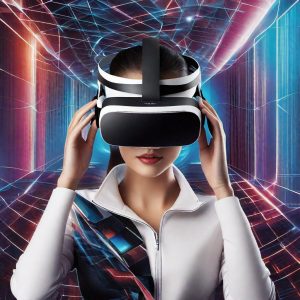
One of the most interesting features of VR/MR technologies is their ability to not only transform the way we perceive the world around us, but also to remake our social interactions. Virtual and mixed reality will create a new space for communication, exchange of ideas, and interaction, breaking down physical limitations and opening up endless possibilities for social communication.
One of the key advantages of using VR and MR in social interactions is the ability to meet and communicate with family and friends regardless of geographic distance. Virtual worlds will allow you to create immersive environments where people can meet, discuss and share their thoughts as if they were right next to each other. This is especially true in the modern world, where work and personal commitments often make physical meetings difficult. Thanks to VR and MR, we can feel present and close to each other, even if we are separated by thousands of kilometers.
Of course, recreating real emotions and relationships can be more difficult in virtual environments. However, the development of technology today indicates that these issues will be resolved in the near future. From realistic facial expressions, gestures, and emotions to improving artificial intelligence technologies to enhance mutual understanding, scientists and engineers are actively working to make VR and MR interactions even closer to real-life communication.
In addition, VR and MR open the door to new forms of social interaction that are hard to imagine in traditional contexts. Creating your own virtual worlds and communities can help bring people who share common interests closer together, regardless of where they live.
Ultimately, VR and MR technologies will transform the way we communicate, breaking down the constraints of time and space. They will give us the opportunity to experience intimacy and communication, regardless of location, and open the door to new, exciting forms of social interaction. And while our interactions may differ from traditional ones, this evolutionary step in communication paves the way for building a more united and global society.
The impact of virtual/mixed reality on business and the labor market
Virtual and mixed reality are no longer just gaming technologies. They are gradually turning into powerful tools for business and education. VR allows users to immerse themselves in completely different worlds, while MR combines the real and virtual worlds, expanding the possibilities of interaction.
The applications of VR in business are endless. From training simulations for medical professionals to virtual real estate inspections. Team meetings can be held virtually, bringing together colleagues from different parts of the world. Technical problems can also be solved virtually, which reduces travel costs and time to resolve problems.
The mixed reality will also have a significant impact on the labor market. New professions will emerge related to the development and management of virtual and mixed environments. Virtual application developers, virtual world designers, and augmented reality specialists will become important players in the labor market.
Of course, the emergence of VR/MR also brings challenges. From data privacy issues to possible health impacts, these technologies require a cautious approach. Also, not all business sectors can easily adapt to new technologies, and some businesses may need additional time to integrate.
The innovations that virtual reality will bring in the future will open up endless opportunities for development, learning, and collaboration. However, the success of these technologies depends on the ability of companies and professionals to adapt to new realities. Are they ready to plunge into this virtual world and become initiators of transformations that bring the future closer? We will get the answer to this question very soon…

